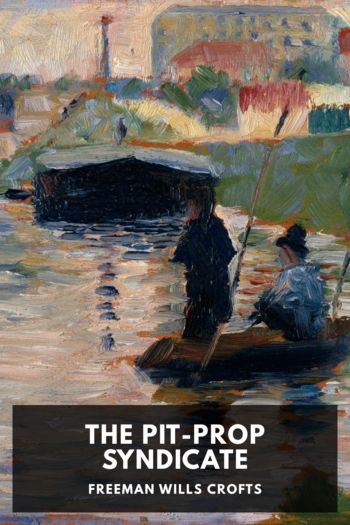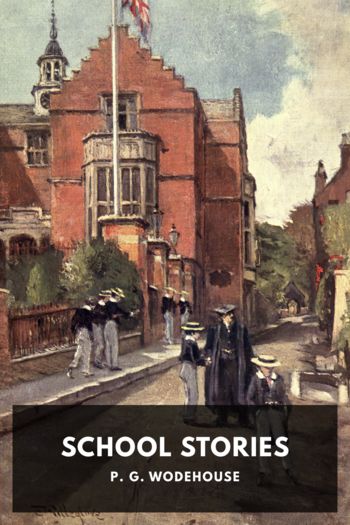Ukridge Stories by P. G. Wodehouse (best large ereader TXT) 📕

- Author: P. G. Wodehouse
Book online «Ukridge Stories by P. G. Wodehouse (best large ereader TXT) 📕». Author P. G. Wodehouse
“What?”
“The dogs.”
“Got distemper?”
“No. Worse. My landlord’s pinched them as security for his infernal rent! Sneaked the stock. Tied up the assets. Crippled the business at the very outset. Have you ever in your life heard of anything so dastardly? I know I agreed to pay the damned rent weekly and I’m about six weeks behind, but, my gosh! surely a man with a huge enterprise on his hands isn’t supposed to have to worry about these trifles when he’s occupied with the most delicate—Well, I put all that to old Nickerson, but a fat lot of good it did. So then I wired to you.”
“Ah!” I said, and there was a brief and pregnant pause.
“I thought,” said Ukridge, meditatively, “that you might be able to suggest somebody I could touch.”
He spoke in a detached and almost casual way, but his eye was gleaming at me significantly, and I avoided it with a sense of guilt. My finances at the moment were in their customary unsettled condition—rather more so, in fact, than usual, owing to unsatisfactory speculations at Kempton Park on the previous Saturday; and it seemed to me that, if ever there was a time for passing the buck, this was it. I mused tensely. It was an occasion for quick thinking.
“George Tupper!” I cried, on the crest of a brainwave.
“George Tupper?” echoed Ukridge, radiantly, his gloom melting like fog before the sun. “The very man, by Gad! It’s a most amazing thing, but I never thought of him. George Tupper, of course! Bighearted George, the old school-chum. He’ll do it like a shot and won’t miss the money. These Foreign Office blokes have always got a spare tenner or two tucked away in the old sock. They pinch it out of the public funds. Rush back to town, laddie, with all speed, get hold of Tuppy, lush him up, and bite his ear for twenty quid. Now is the time for all good men to come to the aid of the party.”
I had been convinced that George Tupper would not fail us, nor did he. He parted without a murmur—even with enthusiasm. The consignment was one that might have been made to order for him. As a boy, George used to write sentimental poetry for the school magazine, and now he is the sort of man who is always starting subscription lists and getting up memorials and presentations. He listened to my story with the serious official air which these Foreign Office fellows put on when they are deciding whether to declare war on Switzerland or send a firm note to San Marino, and was reaching for his chequebook before I had been speaking two minutes. Ukridge’s sad case seemed to move him deeply.
“Too bad,” said George. “So he is training dogs, is he? Well, it seems very unfair that, if he has at last settled down to real work, he should be hampered by financial difficulties at the outset. We ought to do something practical for him. After all, a loan of twenty pounds cannot relieve the situation permanently.”
“I think you’re a bit optimistic if you’re looking on it as a loan.”
“What Ukridge needs is capital.”
“He thinks that, too. So does Gooch, the grocer.”
“Capital,” repeated George Tupper, firmly, as if he were reasoning with the plenipotentiary of some Great Power. “Every venture requires capital at first.” He frowned thoughtfully. “Where can we obtain capital for Ukridge?”
“Rob a bank.”
George Tupper’s face cleared.
“I have it!” he said. “I will go straight over to Wimbledon tonight and approach his aunt.”
“Aren’t you forgetting that Ukridge is about as popular with her as a cold Welsh rabbit?”
“There may be a temporary estrangement, but if I tell her the facts and impress upon her that Ukridge is really making a genuine effort to earn a living—”
“Well, try it if you like. But she will probably set the parrot on to you.”
“It will have to be done diplomatically, of course. It might be as well if you did not tell Ukridge what I propose to do. I do not wish to arouse hopes which may not be fulfilled.”
A blaze of yellow on the platform of Sheep’s Cray Station next morning informed me that Ukridge had come to meet my train. The sun poured down from a cloudless sky, but it took more than sunshine to make Stanley Featherstonehaugh Ukridge discard his mackintosh. He looked like an animated blob of mustard.
When the train rolled in, he was standing in solitary grandeur trying to light his pipe, but as I got out I perceived that he had been joined by a sad-looking man, who, from the rapid and earnest manner in which he talked and the vehemence of his gesticulations, appeared to be ventilating some theme on which he felt deeply. Ukridge was looking warm and harassed, and, as I approached, I could hear his voice booming in reply.
“My dear sir, my dear old horse, do be reasonable, do try to cultivate the big, broad flexible outlook—”
He saw me and broke away—not unwillingly; and, gripping my arm, drew me off along the platform. The sad-looking man followed irresolutely.
“Have you got the stuff, laddie?” enquired Ukridge, in a tense whisper. “Have you got it?”
“Yes, here it is.”
“Put it back, put it back!” moaned Ukridge in agony, as I felt in my pocket. “Do you know who that was I was talking to? Gooch, the grocer!”
“Goods supplied to the value of six pounds three and a penny?”
“Absolutely!”
“Well, now’s your chance. Fling him a purse of gold. That’ll make him look silly.”
“My dear old horse, I can’t afford to go about the place squandering my cash simply in order to make grocers look silly. That money is earmarked for Nickerson,





Comments (0)